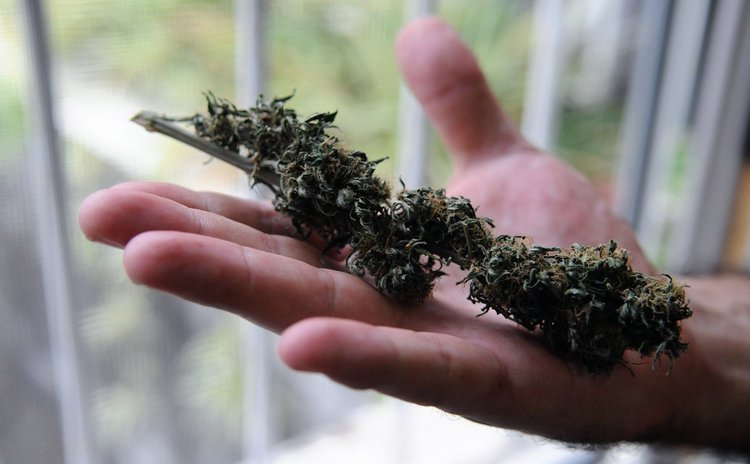Puff on a Spliff
CADRES Survey finds majority of Dominicans wants to make it legal to use marijuana

Government's policy on the issue might be clouded in smoke, but support for some form of legalisation of marijuana here is very much on a high.
A recent survey conducted by the Barbadian polling company CADRES has found that a majority of Dominicans have no problem with easing the laws that make it illegal to cultivate, possess or sell ganja.
Although a plurality wants marijuana to remain illegal, the 34 per cent who are of this view is only marginally higher than the 31 per cent who believe it should be made legal for medical or religious purposes only. In addition 26 per cent say it should be made completely legal – for medical, religious or recreational purposes, revealing that 57 per cent of Dominicans want an end to the status quo.
The survey was part of a poll commissioned by the Dominica Labour Party (DLP) to feel the pulse of the people on the opposition protests against prime minister Roosevelt Skerrit's handling of the sale and distribution of Dominican passports to non-nationals.
This notwithstanding, those close to Skerrit tell The Sun it doesn't mean government is about to free up the weed.
"He has spoken of his opposition [to legalisation or decriminalisation] on account of his view that it will make a bad drug situation worse," one of the prime minister's confidants explains.
However, last December Skerrit suggested to the government-leaning Kairi FM he was willing to entertain a discussion on decriminalising the drug for medical purposes.
"I think in the new year you will see a more focused, more structured approach to the discussion. I think that if there is a plant in our country which people are swearing by as having saved their lives or assisted them in reducing the pain or managing their ailment, then I think it is important for there to be a very serious discussion about it, and to see how we can go about taking advantage of this development."
It was consistent with the position he expressed in 2014 when he revealed plans to review and perhaps alter the marijuana laws with the view to lifting some restrictions.
Still, in the Kairi FM interview in December he said government was not entirely opposed to the eventual legalisation, with some considerations.
"It is not something that we are opposed to, but it has to be in a very structured and focused manner, rather than just legalising the herb," he said then.
The marijuana debate has always been a contentious one, but support for it across the region has been growing steadily.
Jamaica has decriminalised its use and regional governments have launched a commission to explore options.
"It was therefore thought prudent to include a relevant question in the survey as this is one of the pertinent issues impacting on Dominican public opinion currently," pollster Peter Wickham tells The Sun, which was given exclusive access to portions of the results of the poll, conducted from 26-29 May .
CADRES has done similar surveys in four other Caribbean countries, and Wickham says "support for decriminalisation in Dominica is consistent with that of the other islands".
In St. Vincent and the Grenadines, support for full legalisation doubled in a three-year period, from nine per cent in 2013 to 18 per cent in 2017, although there is a slight dip in support for partial legalisation (35 per cent in 2017 as compared to 36 per cent in 2013). The percentage of those who said it should remain illegal fell from 44 per cent in 2013 to 35 per cent this year.
But it is in Barbados where CADRES polled people on the subject in 2008, 2014 and again in June of this year, that the steady rise in support for some form of legalisation is most evident.
Back in 2008 three-quarters of Barbadians (73 per cent) were completely opposed to any form of legalisation, but by 2014 that number had dropped significantly to 37 per cent, with nearly half (45 per cent) in support of partial decriminalisation or full legalisation.
This year, the most interesting finding is in the number of people who now support full legalisation, with this number rising to 24 per cent from 15 per cent three years ago (it was 14 per cent in 2008).
The findings here will be like a puff on a spliff for Henry Shillingford, the attorney and relentless campaigner for legalisation.
Back in 2014 Shillingford told The Sun the time was right for Dominica to legalise the drug in part because the island is an agriculture-based economy, and sells itself as an eco-tourism and health and wellness destination.
"It's an opportunity for Dominica to shift its economy, to move to a 21st century product. By legalizing cannabis you are really making a statement for nature. By doing that you are enhancing your 'Nature Island of the World' brand," he said then, adding that he supported control on its use and sale, as well as a ban on exports.




